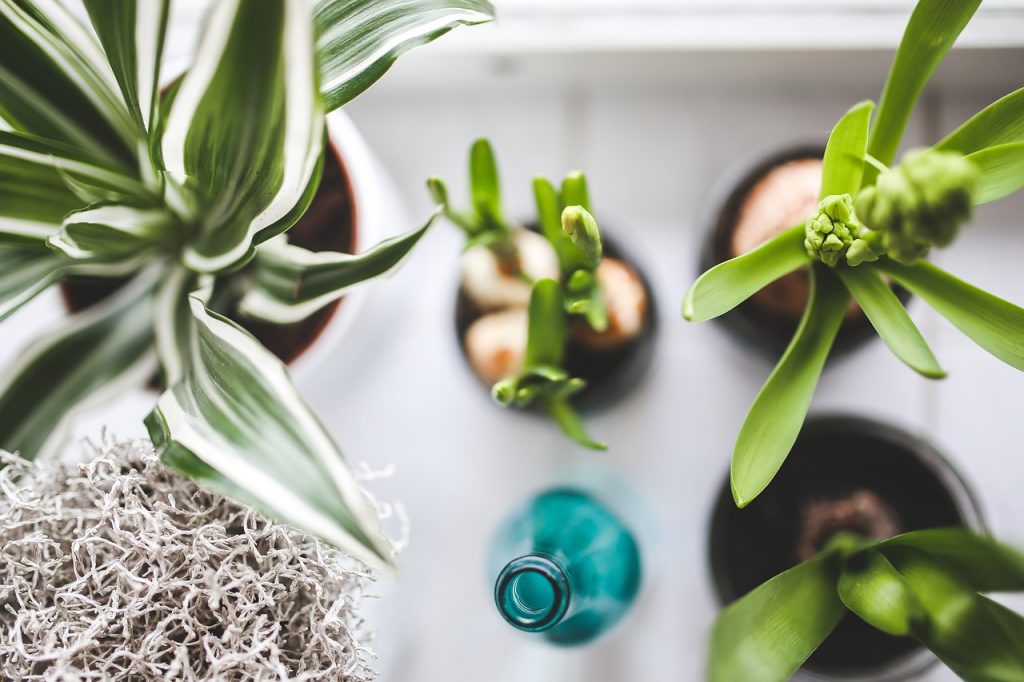
If you’re passionate about gardening and caring for plants, you might have thought about whether bottled water is good for plants or not. You’ve probably already tried using different types of water to grow and maintain the health of your plants. So let’s take a look at what type of water is good for your plants.
Is bottled water good for plants? Well, yes. Plants need water to grow. And any type of water is good for plants. A better question, though, is, how good is bottled water for plants? The answer to that is, it depends. Some types of bottled water are good for plants. Others are not so good. Among the different types of bottled water, spring water is deemed best for plants. On the other hand, (bottled) purified or distilled water is the least beneficial for plants.
Table of Contents
Why Is Spring Water The Best?
Plants benefit from the natural minerals that spring water contains. They will grow faster and fare better. Likewise, distilled water will sustain and maintain your plants. But purified water, including distilled water and deionized water, doesn’t have the nutrients that spring water contains. So if you water plants with that, they won’t grow and thrive as well as they would if you use spring water.
Pros & Cons Of Bottled Water
Each type of bottled water has different benefits and drawbacks for your plants. Check them out below.
Sparkling Water
This bottled water contains carbon dioxide. It’s a lot like sodas. It adds fizz but without the calories. CO2 boosts nitrogen levels, the amount of plant nutrients, and, the rate of leaf photosynthesis. Some experiments showed that carbon dioxide infused water contributes to plant growth.
The drawback would be the cost of using sparkling water to water your plants. If you maintain a few plants, you can sustain the costs. For a regular to large garden, it’s likely not a cost-effective way to water your plants.
Spring Water
You can call quality bottled spring water as the purest of the pure. Bottlers collect it from underground sites where water naturally flows upwards to the surface. As it flows through the rocks, it absorbs natural minerals. It’s also free from contaminants and chemicals.
The drawback would still be the same as sparkling water, which is, the running costs of using bottled spring water for your plants. If you’re lucky enough to have access to a nearby spring, then well and good. Otherwise, expect regular trips to the shops.
Mineral Water
Bottled mineral water is basically the same as bottled spring water. But there’s even more mineral content. This type of bottled water contains at least 250 parts per million TDS (Total Dissolved Solids). Very likely, there are also sodium traces along with calcium, potassium, and sulfates. Some bottling companies further add minerals.
There are some drawbacks to using bottled mineral water for your plants. First is the cost. Next, it may slow down plant growth. And your plant may not be as healthy. The high mineral and sodium content may pose problems to your plant.
There are also additives in mineral water that your plant doesn’t need. If these remain in the soil along with the salt content, your soil may get affected.
Purified water
Purified bottled water has undergone treatments like reverse osmosis (deionization) or distillation. These treatments remove bacteria and dissolved solids.
Commonly, purification methods will remove beneficial minerals as well. But, there are some companies that purify water in different stages. Stages include a process where minerals are added back to the water.
The main drawbacks to using this, primarily, is the cost. Second, with less mineral content, your plants benefit less.
Further, some purification methods consequently inject additives or unnatural components to your water. Thus, can cause your plants to suffer from stunts in growth.

What Other Types Of Water Can You Use On Your Plants?
If you can’t get your hands on some bottled water, there are other options available. As I’m sure you’re already aware!
Tap Water
Tap water is every home’s basic and regular water source. It’s what gardeners commonly use to water their plants. There isn’t much of a drawback since running costs are definitely lower compared with buying bottled water for plant use.
But there is a drawback for places which have hard water. This means tap water in those areas has extra chemicals like magnesium and calcium. High concentrations of sodium may also be present since sodium softens water.
If you live in such a place, consider using a charcoal filter to water your indoor plants that don’t get rainwater.
Rainwater
Naturally, rainwater is the best choice for watering plants. It’s natural. It doesn’t have hard water elements. The pH level is suited for most plants. It’s also free. When it rains, it pours. And your plants get watered by mother nature. You may also collect rainwater in containers. Just don’t store them for a long time.
Use them whenever you can. Else, the container may become a breeding ground for bacteria. That will be harmful to your plants. You should apply proper cleaning methods to your rain barrel or container. And always ensure that you pour the rainwater on to the soil and not directly on the leaves.
The only drawback is the seasonality of rainwater. Droughts will cut rainwater supply. You may also run out of stored rainwater in summer.
Well Water
Well water is untreated groundwater. It is likely hard water as well. In essence, well water is rainwater that’s moved through the soil and collects in an aquifer (an underground permeable rock that stores water). It’s likely to absorb other components. Therefore, it’s not pure. Well water is generally deemed unsafe for human consumption. But like with rainwater, plants can receive well water.
If you have well water, you can use them on your plants. There seems to be no drawback to using well water on plants. It’s a free source that households and farms have been utilizing to water their gardens.
Boiled Water
Some gardeners treat water with boiling. Boiling water will kill contaminants and bacteria that are harmful to your sensitive plants. If you suspect that your tap water is contaminated, this is an option for you.
Remember to cool the water before using them on your plants, and use a saucer. Heat may damage your plants. It may even kill them.

The Essential Guide to Using Distilled Water for Plants - Gardening Mentor
Monday 31st of July 2023
[…] fed with spring water experience faster growth rates and better overall […]
How To Flush Plants Without Overwatering? (5 Easy Steps)
Wednesday 19th of April 2023
[…] a water can or bucket. Also, you need to ensure you are using only spring water. According to the IHG, spring water is best for flushing because it contains fewer minerals and chemicals that can […]
How To Store Rainwater For Plants – Bescord
Monday 30th of May 2022
[…] But like with rainwater, plants can receive well water. If you have well water, you can use them on your plants. There seems to be no drawback to using well water on plants. via […]
How To Fix Hard Water For Plants – Bescord
Monday 30th of May 2022
[…] Plants benefit from the natural minerals that spring water contains. They will grow faster and fare better. Likewise, distilled water will sustain and maintain your plants. But purified water, including distilled water and deionized water, doesn't have the nutrients that spring water contains. via […]
What Water To Use For Venus Fly Trap – Bescord
Sunday 29th of May 2022
[…] Plants benefit from the natural minerals that spring water contains. They will grow faster and fare better. Likewise, distilled water will sustain and maintain your plants. But purified water, including distilled water and deionized water, doesn't have the nutrients that spring water contains. via […]